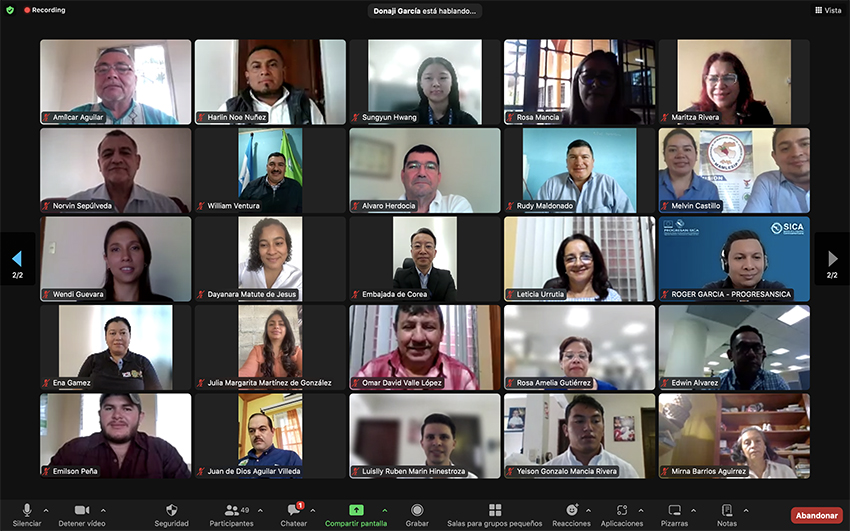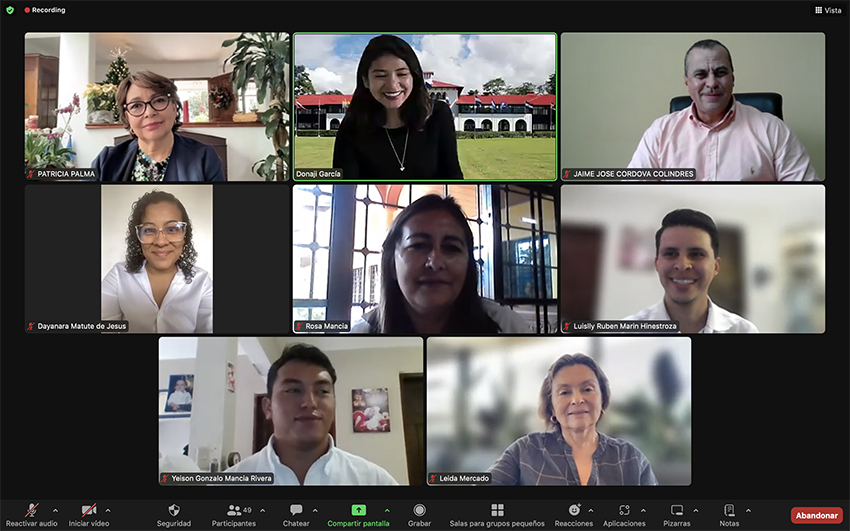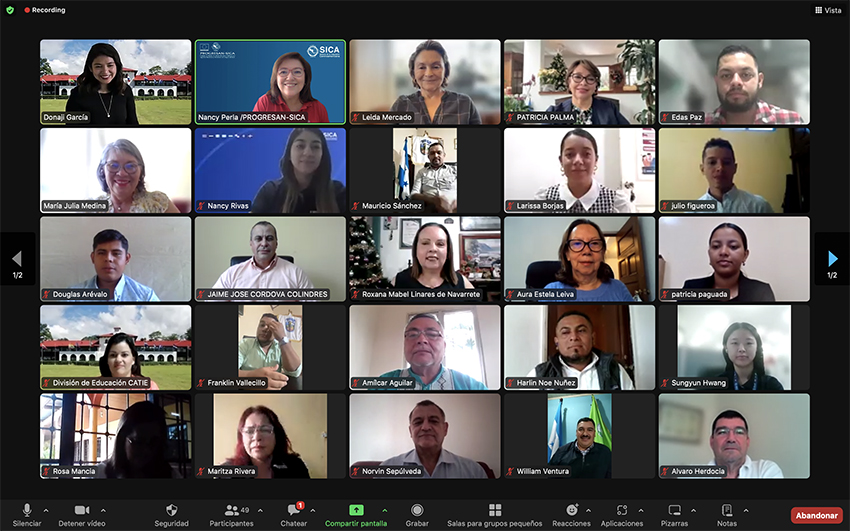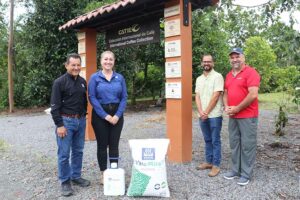CATIE and SICA celebrate graduation of diploma course to implement Field Schools in food security

- 26 professionals from El Salvador, Guatemala and Honduras successfully complete their training in food security and climate-smart agriculture.
November 30, 2023. On the morning of November 29, CATIE (Tropical Agricultural Research and Higher Education Center) and the Central American Integration System (SICA) celebrated the graduation of 26 professionals from El Salvador, Guatemala and Honduras, who successfully completed the diploma course on Capacity Building to Implement Field Schools with an Emphasis on Food Security under Climate-Smart Agriculture Principles.
The course, which lasted 284 hours in hybrid mode, is part of the Capacity Building for Resilience for Food and Nutrition Security and Smart Agriculture project, financed by the Republic of Korea through the Korea SICA Fund and with the technical support of the Information Systems for Resilience in Food and Nutrition Security of the PROGRESAN - SICA Region.
The main purpose of this training was to increase the skills, knowledge and abilities of the participants in practices, tools and strategies related to the planning, organization and implementation of Field Schools in food and nutrition security under the principles of climate-smart agriculture.

The diploma courses included:
- Principles of Agricultural Field Schools with emphasis on food and nutrition security (ECASAN).
- Food and nutritional security (SAN).
- Climate-smart agriculture (CSA), under the methodology of learning linked to results (LRLA).
The graduation ceremony was attended by William Saúl Ventura, mayor of Santa Elena, La Paz, Honduras; Lee Yeahyun, counselor of the Embassy of the Republic of Korea in El Salvador and a delegation from the Republic of Korea; Leida Mercado, coordinator of the ESCALAR project, funded by the Swedish Cooperation and implemented by CATIE; Nancy Rivas, coordinator of strategic management of International Cooperation of the General Secretariat of SICA; and Maritza Rivera and Amílcar Aguilar, coordinators of the training process from CATIE.
Patricia Palma, director of the Information Systems for Resilience in Food and Nutritional Security Information Systems Program for the SICA Region, noted the importance of strengthening capacities and stressed that the graduation of these professionals will contribute significantly to the sustainability of processes in the region, especially in terms of food security. "It is a commitment to make urgent changes in the region, especially in food security issues, where the gaps are very large, but working in a comprehensive manner in collaboration and with new approaches can achieve significant progress. Not many institutions are dedicated to strengthening capacities with mystique, and even fewer reach the field, which is why SICA is a partner of CATIE," said Palma.
For his part, Mercado mentioned that capacity building processes are fundamental pillars for CATIE as an institution, since these actions contribute to the sustainable development of the region; he also stated that the Field Schools have proven to be an important element for the transformation of realities from the technical side and with rural and peasant families.
The Honduran student, Melvin Castillo, who obtained the highest grade in the diploma course, expressed his gratitude for the technical knowledge acquired and the enriching experience of learning alongside people from the three participating countries.
In his speech, Mayor Ventura commented on the importance of climate-smart agriculture and the fundamental role it plays in climate change resilience. He highlighted that the Santa Elena Field School stands out for its inclusion of women, promoting learning opportunities and closing gender gaps in the region.
The delivery of certificates was carried out by Field Schools in Food Security, Nutrition and Smart Agriculture (ECASAN), and covered various crops, such as vegetables, coffee, livestock, basic grains and tubers such as cassava.
This training process promises to have a significant impact on the development of the Central American region, contributing to resilience and food security in a context of climate change and agricultural challenges.
Graduates
The diploma program was offered in El Salvador, Guatemala and Honduras. Graduates from the departments of Ocotepeque, La Paz, Olancho and El Paraíso, in Honduras, focused on vegetables, coffee, livestock and cassava production and processing:
- Esly Dayanara Matute de Jesús
- Luislly Rubén Marín Hinestroza
- Rosa Enma Mancía River
- Yeison Gonzalo Mancía Rivera
- Juan de Dios Aguilar Villeda
- Rudy Adelmo Maldonado Reyes
- Doris Elizabeth Garcia Martínez
- Melvin Castillo Montes
- Jaime José Córdova Colindres
- Harlin Noe Nuñez Maradiaga
- Larissa Rossany Borjas González
- Patricia Alejandra Paguada Ponce
- Dora Leticia Urrutia Maradiaga
- Franklin Eulises Vallecillo
- Henri Mauricio Sánchez Rodríguez
- Omar David Valle López
- Edas Humberto Paz Sánchez
In the department of Santa Ana and the municipality of Ahuachapán, in El Salvador, specializing in basic grains and vegetables graduated:
- Ángel Efraín Ramírez Morales
- Jorge Luis Quintanilla Trigueros
- Wendi Tatiana Guevara Ramos
- Brenda Magali Perdomo De Reyes
- Douglas Iván Arévalo Juárez
- Julia Margarita Martínez de González
- Roxana Mabel Linares de Navarrete
From Asunción Mita, Jutiapa, in Guatemala they specialized in basic grains:
- Edwin Alfredo Ríos Monzón
- Julio Cesar Figueroa Cámbara

More information:
Amílcar Aguilar
Field Coordinator of the ESCALAR project
Inclusive Green Research and Development Division
CATIE
amilcar.aguilar@catie.ac.cr
Written by:
Donaji García Valdiviezo
ESCALAR Project Communicator
CATIE
donaji.garcia@catie.ac.cr



